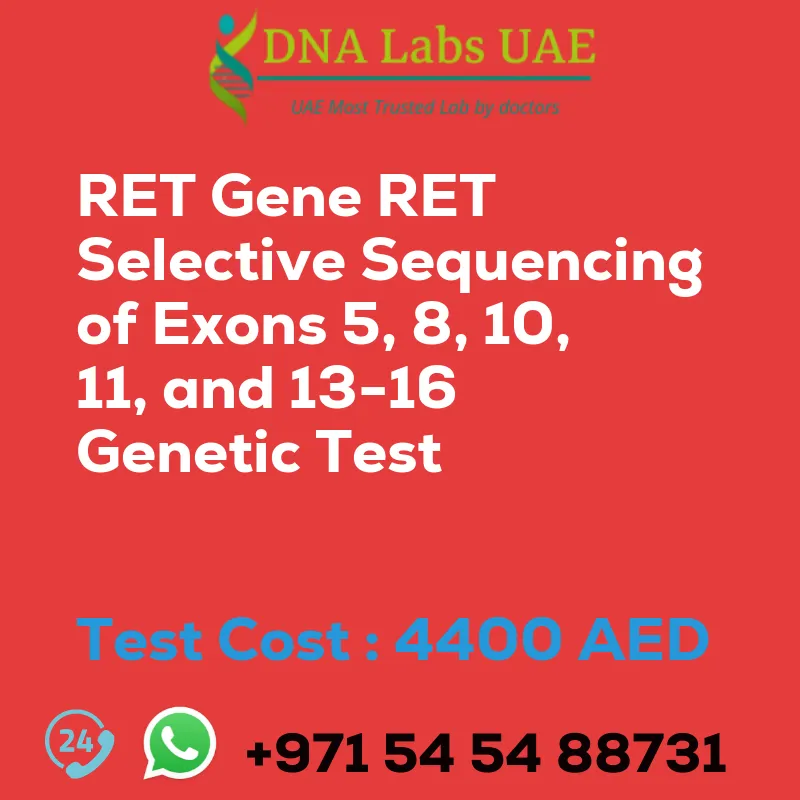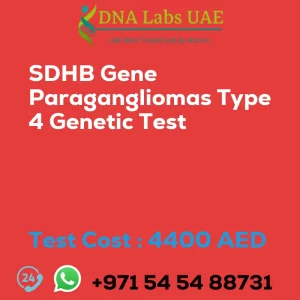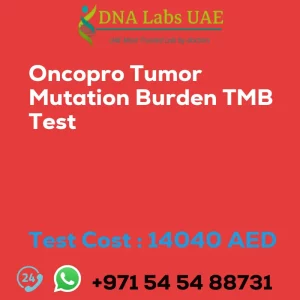RET Gene RET Selective Sequencing of Exons 5 8 10 11 and 13-16 Genetic Test
Welcome to DNA Labs UAE, your trusted genetic lab for advanced DNA testing. Today, we will be discussing the RET Gene RET selective sequencing of exons 5, 8, 10, 11, and 13-16 genetic test. This test is crucial for the diagnosis and management of genetic disorders such as multiple endocrine neoplasia type 2 (MEN2) and familial medullary thyroid carcinoma (FMTC).
Test Name: RET Gene RET Selective Sequencing of Exons 5 8 10 11 and 13-16 Genetic Test
Components: Blood or Extracted DNA or One drop Blood on FTA Card
Price: 4400.0 AED
Sample Condition: Blood or Extracted DNA or One drop Blood on FTA Card
Report Delivery: 3 to 4 Weeks
Method: NGS Technology
Test Type: Cancer
Doctor: Oncologist
Test Department: Genetics
Pre Test Information: Clinical History of Patient who is going for RET Gene RET selective sequencing of exons 5, 8, 10, 11, and 13-16 NGS Genetic DNA Test. A Genetic Counselling session to draw a pedigree chart of family members affected with RET Gene RET selective sequencing of exons 5, 8, 10, 11, and 13-16 NGS Genetic DNA Test gene RET
Test Details
The RET gene, also known as the rearranged during transfection gene, is a proto-oncogene that codes for a receptor tyrosine kinase involved in cell growth and development. Mutations in the RET gene have been associated with several genetic disorders, including multiple endocrine neoplasia type 2 (MEN2) and familial medullary thyroid carcinoma (FMTC).
Selective sequencing of specific exons of the RET gene, such as exons 5, 8, 10, 11, and 13-16, is a type of genetic test known as next-generation sequencing (NGS). NGS allows for the simultaneous sequencing of multiple genes or regions of interest, providing a comprehensive analysis of genetic variations. By targeting these specific exons, the NGS genetic test can identify mutations or variants within the RET gene that may be associated with MEN2 or FMTC.
These mutations can help diagnose individuals at risk of developing these disorders or guide treatment decisions. Overall, the selective sequencing of exons 5, 8, 10, 11, and 13-16 of the RET gene using NGS is a valuable tool in the genetic testing of individuals suspected to have MEN2 or FMTC, allowing for early detection, risk assessment, and personalized management of these genetic disorders.
| Test Name | RET Gene RET selective sequencing of exons 5 8 10 11 and 13-16 Genetic Test |
|---|---|
| Components | |
| Price | 4400.0 AED |
| Sample Condition | Blood or Extracted DNA or One drop Blood on FTA Card |
| Report Delivery | 3 to 4 Weeks |
| Method | NGS Technology |
| Test type | Cancer |
| Doctor | Oncologist |
| Test Department: | Genetics |
| Pre Test Information | Clinical History of Patient who is going for RET Gene RET, selective sequencing of exons 5, 8, 10, 11 and 13-16 NGS Genetic DNA Test. A Genetic Counselling session to draw a pedigree chart of family members affected with RET Gene RET, selective sequencing of exons 5, 8, 10, 11 and 13-16 NGS Genetic DNA Test gene RET |
| Test Details |
The RET gene, also known as the rearranged during transfection gene, is a proto-oncogene that codes for a receptor tyrosine kinase involved in cell growth and development. Mutations in the RET gene have been associated with several genetic disorders, including multiple endocrine neoplasia type 2 (MEN2) and familial medullary thyroid carcinoma (FMTC). Selective sequencing of specific exons of the RET gene, such as exons 5, 8, 10, 11, and 13-16, is a type of genetic test known as next-generation sequencing (NGS). NGS allows for the simultaneous sequencing of multiple genes or regions of interest, providing a comprehensive analysis of genetic variations. By targeting these specific exons, the NGS genetic test can identify mutations or variants within the RET gene that may be associated with MEN2 or FMTC. These mutations can help diagnose individuals at risk of developing these disorders or guide treatment decisions. Overall, the selective sequencing of exons 5, 8, 10, 11, and 13-16 of the RET gene using NGS is a valuable tool in the genetic testing of individuals suspected to have MEN2 or FMTC, allowing for early detection, risk assessment, and personalized management of these genetic disorders. |








